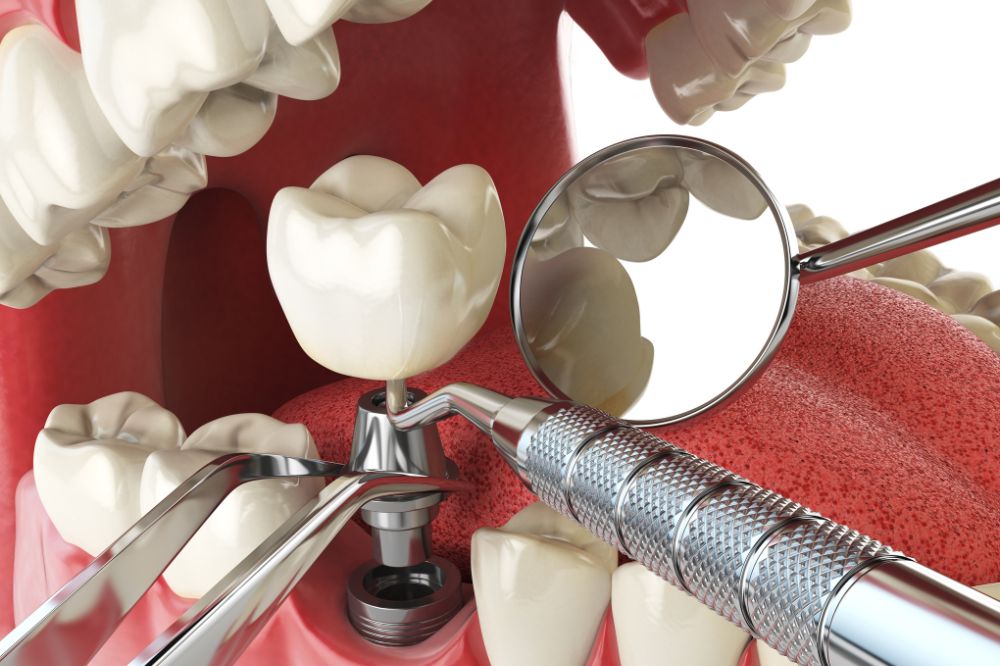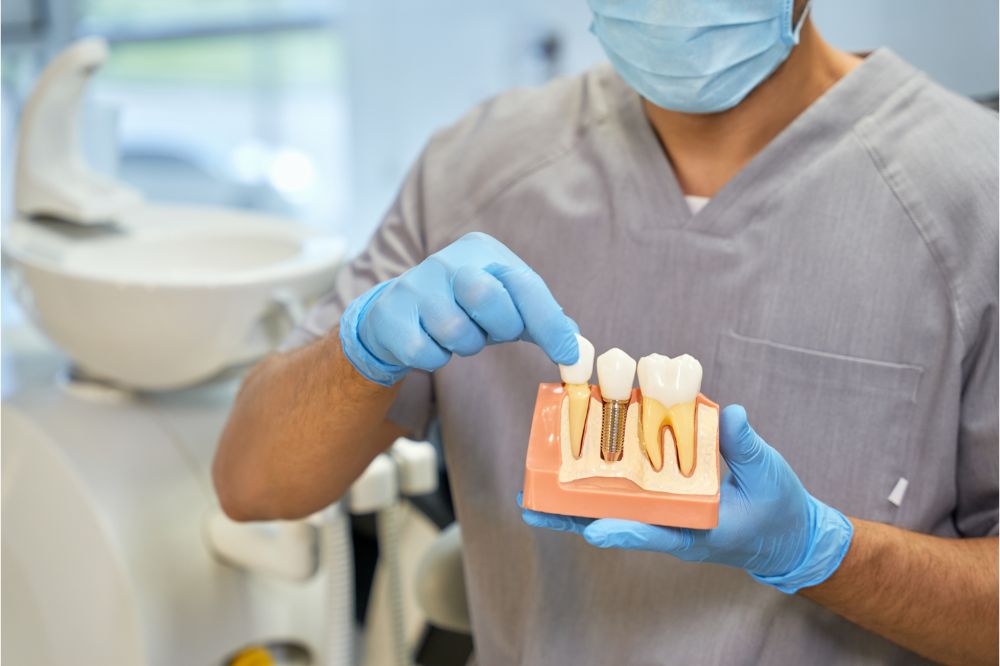Dental implants are a long-term solution to tooth loss, and nowadays, the procedure can give you natural-looking teeth that should last an extremely long time.
However, if you’re wondering about exactly how long – or what you can do to increase their lifespan – in this post, we bring you all the answers you need as we look at the question, how long do dental implants last?
How Long Do Dental Implants Last? The short answer
Before we get into the details of this question, let’s start with a short answer.
How long do dental implants last?
Dental implants are designed to be permanent, so in theory, they are intended to last for the rest of the patient’s life.
However, in practice, studies have shown that implants usually have a 90-95% chance of success over ten years, and if the initial process of installation is successful, with proper care and maintenance, you can reasonably expect your implants to last at least 15-25 years.
Of course, there’s a lot more to this question than just this simple answer, and there several factors can determine how long dental implants last, something we’ll come back to in a moment. So now let’s have a look at how long dental implants last in more detail.
What are dental implants and how do they work?

If we want to understand how long dental implants can last and what might affect their longevity, first, we need to talk about what they are and how they work.
A dental implant consists of separate parts, and the part that holds everything in place is essentially a small screw, usually made of titanium, that is attached directly to the jaw.
The first part of the installation process involves inserting this part into the jaw, after which the bone of the jaw fuses to it through a process known as osseointegration. Essentially, this involves the bone growing back around the implant to hold it securely in place.
This part replicates the root of a natural tooth, providing a solid base to hold the rest of the implant.
Once the jaw has healed and osseointegration is complete, the screw will then remain fixed in place potentially for the rest of the patient’s life.
When the first phase is complete, what’s known as the “crown” – the part that replicates the tooth itself – is then placed on the titanium base.
Crowns are usually made of porcelain or ceramic, and these materials provide the most natural look. However, other materials such as gold are possible – gold is known for being the most durable option.
Since the crown is the part of the implant that’s used for biting or chewing, it can suffer from regular wear and tear. As a result, crowns will often eventually need to be replaced.
According to research, 90% of crowns will last at least five years, and 50-80% will need to be replaced within 15-20 years.
If you want to learn more about dental implants, you can also check out this video.
What determines the success of a dental implant?
There are many factors that determine how successful a dental implant will be and ultimately how long it will last, and this begins with the initial insertion of the implant and subsequent osseointegration.
For the procedure to work, the patient needs to have a healthy jawbone for the implant to be inserted.
If not enough bone is present, other procedures such as bone grafts, sinus lifts or ridge expansions can be used to prepare the jaw to receive the implant.
If the jawbone is healthy enough to receive the implant, the healing process takes place correctly and proper osseointegration occurs, the implant will generally last a very long time.
However, there are also some reasons why an implant may fail, either soon after the procedure or much later – so let’s look at these now.
1. Failure of osseointegration
Before an implant is fitted, the dentist will assess the patient for suitability, and the jawbone will be carefully examined to make sure enough bone is present for the implant to be fully accepted.
However, in some cases, osseointegration may not take place as expected, and the implant may not become properly fused to the jaw, in which case, the implant may fail.
2. Problems with healing
The healing process after the insertion of the implant may not take place as expected, and this may also cause the implant to fail.
A known aggravating factor for this is smoking since cigarettes reduce the blood flow to the area, which reduces your ability to heal properly.
Smoking is a major risk factor in dental implants failing, so if you are a smoker, you are highly advised to give up – or at least cut down as much as possible – if you are planning to have dental implants fitted.
Drinking large amounts of alcohol is also another known risk factor.
3. Poor care and maintenance
Once your implants are in and the osseointegration process has been completed, you still need to care for your implants just as you would your natural teeth.
Poor oral health can lead to peri-implantitis, a condition that causes inflammation and bone loss around the implant.
This condition is caused by a build-up of plaque and bacteria around the implant site, and if this condition develops and is not treated, it can lead to the implant loosening and potentially eventually falling out.
4. Osteoporosis
Osteoporosis is a weakening of the bone structure and is usually associated with aging. As a result, implants may eventually fail as the patient ages and the jawbone weakens.
5. Other medical conditions
Other medical conditions such as diabetes and a weakened immune system are also associated with dental implants failing.
6. Teeth grinding
Teeth grinding, known technically as “bruxism”, can cause the crown to wear down more quickly and in some cases, the constant pressure from the grinding may cause the crown to crack.
How to make sure your implants last as long as possible
If you have dental implants, there are several things you can do to increase the chance of the procedure being successful and of the implants lasting as long as possible, and here are the most important.
1. Don’t smoke after the procedure
After having the implants fitted to your jawbone, you should avoid smoking – or if you can’t stop completely, try to limit your smoking as much as possible.
This will give the implant the best chance of healing and will allow osseointegration to take place, giving you the best chance of the initial procedure being successful and the implant lasting as long as possible.
2. Don’t drink alcohol after the procedure
Don’t drink any alcohol for at least 72 hours after the implants are fitted to your jaw and limit your alcohol intake as much as possible thereafter.
Alcohol thins the blood, interfering with the healing process, so drinking less will give your body more chance to heal.
3. Follow proper dental hygiene practices
Probably the most important thing you can do to ensure your implants last as long as possible in the long term is to always practice proper oral hygiene.
This means brushing regularly, flossing and using dental mouthwash to kill any bacteria around the implant site.
This will help you avoid problems like gum disease and peri-implantitis that can cause an implant to fail even years after a successful procedure.
4. Go for regular dental check-ups
Going for regular dental check-ups will allow your dentist to monitor the success of the implant over time and catch any problems early.
This way, your dentist can treat problems before they become too serious, making it easier to rectify them before they cause your implant to fail.
5. Avoid hard or chewy foods
Although implants are designed to allow you to eat normally with no restrictions, it would still be wise to avoid certain particularly hard foods such as hard candy.
If you eat foods such as these, you will probably have no problems – but at the same time, biting into something hard like a piece of candy is still not a great idea if you have expensive implants in your mouth and you want to avoid all risk.
The same is true of sticky or chewy foods that could stick you your implant and pull on it as you chew, potentially causing it to come loose or even fall out.
6. Wear a mouthguard when you sleep if you grind your teeth
If you know you grind your teeth when you sleep, you can wear a mouthguard to protect your implant as well as all your other natural teeth.
Dental implants can last a lifetime
As we’ve seen, dental implants are intended to be a permanent solution, and as long as the initial procedure is successful and you continue to care for your implants properly, there’s no reason why they shouldn’t last at least 25 years or longer.
The implants themselves will become fused to your jawbone and may never fall out. However, the crowns may need replacing every decade or two due to regular wear and tear.

